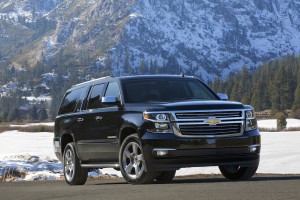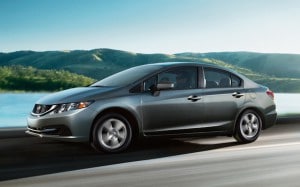
While conventional wisdom has a way of being wrong, a new study by the University of Buffalo suggests that, when it comes to cars, one traditional belief is correct: bigger cars tend to be safer cars.
While even some of the smallest cars on the market today earn five-star crash ratings, it doesn’t necessarily reflect what happens in the real world – especially when that little car smashes into a big one or, worse, an 18-wheeler. The bottom line, according to a study presented during the annual meeting of the Society for Academic Emergency Medicine, is that bigger, more expensive vehicles tend to be the safest.

“The most important point of our study is that vehicle weight and price have a positive relationship with vehicle safety,” said Dr. Dietrich Jehle, a professor of emergency medicine at University of Buffalo School of Medicine and Biomedical Sciences, who presented the research.
The study upends conventional industry data. Using their own methodology, U-B researchers place such popular vehicles as the Honda Accord and Civic, as well as the Toyota Corolla, in their “least safe” category. They had 40% more injuries than the industry average, according to the study.

At the other extreme are such large vehicles as the Ford F-150, Range Rover, Chevrolet Silverado and Cadillac Escalade ESV. One notable exception to the bigger-is-better rule: the “safest” list includes the Mini Cooper Countryman – which is, nonetheless, the British maker’s biggest product line.
The study found that the safety of the average vehicle increased by 19% for every 1,000 pounds of additional weight, while there was a 12% improvement for every additional $10,000 in a vehicle’s price tag.
“One of my pet peeves is that I don’t think consumers have very good information about vehicle safety,” Jehle said. “Neither media advertising nor the five-star safety ratings accurately reflect the level of danger or lack of danger in vehicles.”
(Feds aiming for a “more muscular” approach to auto safety and Congress is ready to help. For more, Click Here.)
The Buffalo study was based on a retrospective study of 360 different vehicle models from 2010 to 2012 and used Highway Loss Data Institute, or HLDI, data to calculate real world injuries. The new study tried to accommodate the fact that some vehicles are driven significantly more than others and, among other things, excluded sports cars because they typically clock relatively few miles.
By comparison, the National Highway Traffic Safety Administration and the Insurance Institute for Highway Safety, base their ratings on crash tests in which vehicles are normally run into fixed barriers. But that may not be a particularly accurate reflection of what happens in the real world, especially when a small car and a big pickup lock horns, the study warns.
(Click Here for details the impact that elderly drivers have on road safety.)
“When smaller cars hit a larger, moving vehicle, that change in velocity can force the smaller car to go into reverse, resulting in far more serious injuries to driver and passenger,” said Jehle.
The study cautions that cost and weight don’t always seem to be the final determinant of crash safety. The Mini Countryman and Jeep Wrangler both had an average 40% fewer personal injury claims. The Volkswagen Golf and the Subaru Outback scored more than 25% better than average. But, on the whole, big pickups and large SUVs tended to top the chart, while small vehicles such as the Honda Civic, Ford Fiesta and Kia Forte had much higher-than-average injury claims.
(GM, Ford and FCA kicking off negotiations with UAW on new contract. Click Here to see if the goodwill handshake will translate to a new deal.)
The study raises some potentially troubling issues for the auto industry at a time when manufacturers are putting heavy emphasis, as it were, on lightweighting. The newest, “aluminum-intensive” version of the Ford F-150 is, for example, about 700 pounds lighter than the steel-bodied version included in the U-B study. And most products are expected to continue getting lighter in the push for better fuel economy.








It’s a bit of a stretch to use safety vs. weight but there is a relationship with size, mass and safety. In other words you could have a Fiat 500 that weighs 5,000 lbs. because you used lead to fill body cavities but is no more safe than a std. Fiat 500 that weighs ~2500 lbs.
As has been discussed before the smaller the car the less room the engineers have to create crush zones that slowly absorb the energy in a crash. With smaller cars and less room you need to use higher strength impact materials. As a result more of the impact energy is transferred to the vehicle occupants. The impact forces for the small car is extreme when a small car collides with a large, heavy vehicle such as a large SUV or heavy truck.
Ford’s use of aluminum should not cause a problem if the design was adjusted to compensate for the lower strength, lighter weight materials which auto makers are switching to in an effort to meet the meritless and impossible 54.5 mpg CAFE decree.
More of the lighter materials would likely be required but they also could absorb energy more gradually than high strength steel or more rigid structures.
Duh
A University conducted a study and found it’s better to be in a Suburban than a Fiesta in a crash.
My, my, the things they teach in school nowadays!